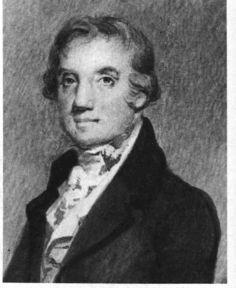Abraham Baldwin

Abraham Baldwin (November 23, 1754 – March 4, 1807) was an American politician, Patriot, and Founding Father from the U.S. state of Georgia. Baldwin was a Georgia representative in the Continental Congress and served in the United States House of Representatives and Senate after the adoption of the Constitution.
Contents |
Early life
Baldwin was born at Guilford, Connecticut. He was the second son of a blacksmith who fathered 12 children by two wives. Besides Abraham, several of the family attained distinction in life. His sister Ruth Baldwin married the poet and diplomat Joel Barlow, and his half-brother Henry Baldwin became an Associate Justice of the Supreme Court of the United States. Their ambitious father went heavily into debt to educate his children.
Minister
After attending a local village school, Abraham graduated from Yale University in nearby New Haven, Connecticut in 1772. Three years later, he became a minister and tutor at the college. He held that position until 1779, when he served as a chaplain in the Connecticut Contingent of the Continental Army. He did not see combat while with the Continental troops.[1]
Two years later, he declined an offer from Yale for a divinity professorship. Instead of resuming his ministerial or educational duties after the war, he turned to the study of law and in 1783 was admitted to the bar at Fairfield.[1]
Statesman
After Baldwin turned down a prestigious teaching position as professor of divinity at Yale, Georgia governor Lyman Hall persuaded him to accept the responsibility of creating an educational plan for both secondary and higher education in the state, believing that the development of the state hinged strongly upon the education of it's citizens. Baldwin strongly believed that education was the key to developing frontier states like Georgia, and decided that the legislature would offer a good opportunity to pursue this route.[1]
Once elected to the Georgia House of Representatives in the state legislature, he developed a comprehensive educational plan that ultimately included land grants from the state to fund the establishment of the University of Georgia (UGA), initially called Franklins College, in Athens, Georgia. Through Baldwin's efforts, UGA became the first state-chartered school in the nation when UGA was incorporated on January 27, 1785. Baldwin served as the first president of the institution during its initial planning phase, from 1785 to 1801. In 1801, Franklin college, UGA's initial college, opened to students with Josiah Meigs succeeding Baldwin as president to oversee the inaugural class of students. The school was architecturally modeled on Baldwin's alma mater, Yale.
Baldwin became very active in the legislature of Georgia, able to mediate between the rougher frontiersman because of his childhood as the son of a blacksmith and the aristocratic plantain elite which farmed the coast. He became one of the most prominent legislators, pushing significant measures such as the education bill through the sometimes split Georgia.[1]
Continental Congress
In 1785 Georgia elected Baldwin to the Continental Congress, remaining in national politics for the rest of his life. In 1787 he attended the Constitutional Convention on behalf of Georgia. He was very active in some of the more controversial issues at the convention, including the issues over representation which pit his native northern Connecticut against other southern states. In response Baldwin created the Great Compromise, which made separate forms of representation for the U.S. Senate and |House of Representatives. Amongst both national and local recognition of his part in finding the compromise, Baldwin was elected five times to the House and two times to the senate, where he sat for one term as President Pro Tem.[1]
Within a year, Baldwin moved to Georgia, won legislative approval to practice law, and obtained a land grant in Wilkes County.
Death and legacy
His remains are interred at Rock Creek Cemetery.
He has been honored by the United States Postal Service with a 7¢ Great Americans series postage stamp.
Baldwin County, Alabama, Baldwin County, Georgia, and Abraham Baldwin Agricultural College in Tifton, Georgia are named in his honor.
References
- ↑ 1.0 1.1 1.2 1.3 1.4 Wright, Jr., Robert K.; MacGregor Jr., Morris J.. "Abraham Baldwin". Soldier-Statesmen of the Constitution. United States Army Center of Military History. CMH Pub 71-25. http://www.history.army.mil/books/RevWar/ss/baldwin.htm.
- Abraham Baldwin at the Biographical Directory of the United States Congress
| United States House of Representatives | ||
|---|---|---|
| Preceded by New Seat |
Member of the U.S. House of Representatives from Georgia's 2nd congressional district March 4, 1789 – March 3, 1793 |
Succeeded by Converted to At-Large districts |
| Preceded by Converted from district seats |
Member of the U.S. House of Representatives from Georgia's At-large congressional district March 4, 1793 – March 3, 1799 |
Succeeded by James Jones (Georgia) |
| United States Senate | ||
|
|||||||||||||||||